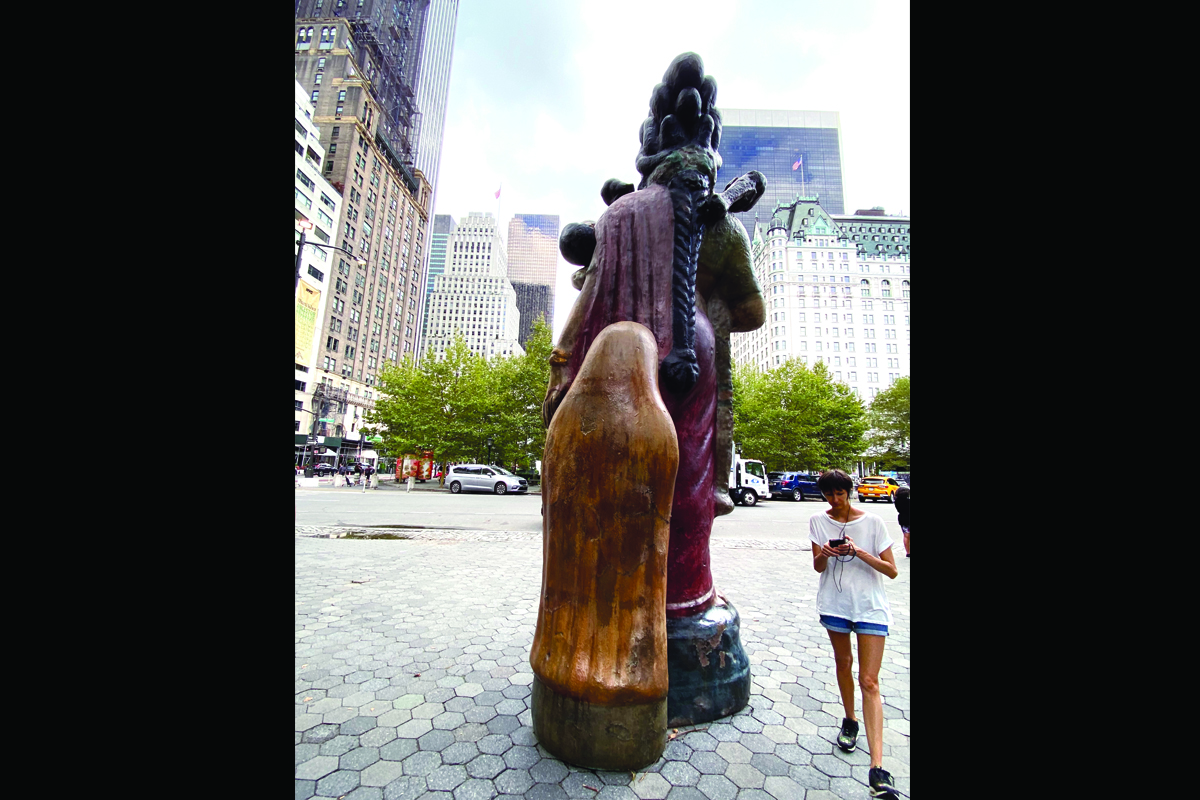It’s women’s history month, and I would really like to see a renewed interest in learning women’s
history, not just social activism.
When I say “women’s history” I mean literally, the study of how women lived and what women accomplished, not just their struggles and protests against patriarchy. Those are important aspects of women’s history, but not the entirety of it. Despite all the obstacles that existed in almost all cultures for women trying to live life on their own terms, it is unlikely that women spent their time over the millennia concerned primarily with fighting against or feeling oppressed by men. They must’ve been engaged in the business of life and probably invented and/or improved many of the technologies and methods of material life: cooking, horticulture, pottery, sewing, binding and cauterizing wounds, who knows what else? There seemed to be a brief burst of interest in researching women’s history from this angle some years ago but then it just disappeared. Maybe it’s because people who support “causes” always naively end up funding social activists instead of scholars and maybe the social activists decided this kind of endeavor isn’t contentious enough to be lucrative as a “movement” (real scholarship rarely is)?
While it’s true that reproductive functions and differential physical abilities naturally led to broad divisions of labor between the sexes, there was also a lot that they did together. Farms and shops were run by whole families together, everyone had work to do, and sometimes they stepped in to do what was outside their usual role. (Why wouldn’t this be the case? Even in the most equal of modern—heterosexual—households, husbands usually do heavy lifting chores and wives nurse the babies. It becomes a pattern based on what people are better at; not an ironclad “rule” and certainly not something the other person won’t ever attempt to do—well, the nursing would be from a bottle, but you get the idea!) Most importantly, the different labors, historically, all went toward the common goal of the survival of the family unit or clan or community.
What we do know about history is that all lives were harsh throughout most of it, thanks to predators, disease, weather, and the sheer struggle for food and shelter—to speak nothing of war and conquest and pillage. Most men also didn’t have it exactly rosy. They were made literal cannon fodder by more powerful men who declared themselves king or emperor and who told them “risk your life for my regime and you’ll have SOME chance of survival, if not, I can just kill you right now; your choice” or something like that. It’s a testament to human ingenuity and fortitude that we’ve created the cultures and civilizations that we have. And women share equally in that—they’re not just a footnote. Their story isn’t less noteworthy because it differs from men’s. I understand that it was treated as less important while history was being told from a skewed perspective that favored male achievements, but why are we STILL doing it, even in the name of “women’s history” and feminism?
Why do we treat women’s accomplishments as significant ONLY if they relate to men? That is, only if they either signify a struggle against the patriarchy OR if they are the types of activities that men normally engage in, like leading a battalion or gaining admission to a previously all-male profession? Even today, women’s preoccupations and life goals that might be “traditional” are treated as frivolous. Why do we ignore the accomplishments of a woman who raises children while creating a successful home-based business selling fruit preserves and teaching sewing to other women, all the while we lament her “failure” to get herself on the corporate board of a company that sells fruit preserves or sewing classes? I’m not saying women should ONLY aspire to the home-based businesses and NOT the corporate board memberships. I’m saying individual ambitions and interests vary greatly and there do seem to be SOME differences, in the aggregate, between women’s interests and men’s, especially when they become parents. Even the most nurturing father is more likely (though not invariably) to feel an urge to provide materially for his child rather than to feed and bathe the child, while even the most career minded of mothers is more likely (though not invariably) to prioritize direct physical engagement with childcare. Why is this natural tendency of women so denigrated—or at least assumed to be unfortunate—by modern feminists?
Let me clarify something here. This is not an antifeminist rant. I’m a feminist. I’ve been one since birth. My parents will vouch for this. Before I knew the word feminist… before I knew most words… my mind and attitudes were what most people would regard as feminist. I never got stumped by those jokey riddles where the answer was that “the surgeon was a woman!” and things like that. I made up stories that went “Ek je chhilo rani, tar chhilo shat-ta raja”(Bengali for “there once was a queen and her seven kings”), in which the princess always saved the realm and had all the adventures. And I never did any of it to be subversive or rebellious. This is what came to me organically. I think when kids are allowed to be creative and authentic they naturally think from their own perspective and not through the prism of any received notions about things like who is supposed to be the “leader.” Long before I eventually grew up to be a lawyer in the testosterone-filled financial markets of Wall Street, I was going to be an astronaut. And a president. And a firefighter. And a violinist. And an Actress. And (briefly, while enthralled by the BBC series Flambards, which came to America by way of PBS) a horsewoman of some sort.
As an adolescent I read feminist works voraciously. My first bout of teenage depression was triggered by Simone de Beauvoir’s The Second Sex, though I felt grateful to the author for alerting me to the hellhole of a sexist world I’d have to navigate. Luckily, I soon read Germaine Greer’s The Female Eunuch and was somewhat relieved to discover that, while exposing patriarchy’s tendency to treat women a monolithic collection of objects for men’s use with no power or agency (or sex drives) of their own, some feminists were also doing the same, albeit with a different aim (and for me, this meant that maybe the dire picture that I got from some of those feminists, of the dystopian world that awaits me as a woman, might not be entirely accurate). This pattern would be repeated several times, with different sets of authors, before I reached full adulthood.
I was a kid during the “Second-Wave” feminist era (when feminism was still somewhat fringe and independent minded women routinely prefaced their statements with “I’m not a feminist or anything, but…”). I was a young woman during the “Third-Wave” when feminism rebranded itself as mostly rowdy, punkish, and “sex positive”; then came “Fourth Wave” whose definition is still murky; and then came whatever is going on now, in which every regressive, tired stereotype and caricature of womanhood passes for “feminist” as long as you blame men for all of life’s disappointments. I’ve had some areas of disagreement with feminists of various stripes, never more so than in the current era, but I’ve never NOT been a feminist, in the essential sense that I believe women, as individuals, exist in their own right, with their own agency and self-ownership, and they do not require validation in terms of their value to any male or to males in general. They deserve the dignity of full personhood, in rights and responsibilities. You might say it’s a low bar, but even this has been controversial (or simply rejected) throughout history for… “reasons.” And despite my present criticism of feminists, I’m never too far from rediscovering how much some of these ingrained forms of sexism still pervade our lives (but that’s for a topic for another day).
First Wave (and early Second Wave) feminists mostly achieved the goal of officially dismantling those oppressive systems. They changed laws that kept women from voting, inheriting property, practicing a profession or trade, owning a business, not to mention laws that gave men absolute ownership over women in their families and permitted husbands to rape their wives (yes, this was actually “the law” almost everywhere as late as the mid-20th century, and is STILL the case in some countries).
Second Wave feminists took things to the next level, exposing the deep-seated social customs and assumptions that perpetuate a culture of male dominance and work against women, despite legal progress. They had some great insights, but somewhere along the way, they began to treat every aspect of life (especially every difference in male and female behavior and preference) as an expression of gender-based oppression and to shun all traditions of women as inherently “patriarchal.” This is a deeply troubling reading of history and utterly dismissive of women’s agency, culture, and achievements, especially coming from those who claim to support and elevate women and their interests.
Later waves of feminism sometimes made things even worse by increasingly denigrating female traditions while adopting (and demanding “inclusion”in) male ones, even the nauseatingly misogynistic ones, such as the “raunch culture” (described by Ariel Levy in her 2005 book Female Chauvinist Pigs) which promotes debased and caricatured forms of female sexuality, as long as women are allowed to profit from it. I have enough of an individualist/libertarian sensibility to endorse any person’s RIGHT to engage in such behavior (i fit is consensual for all parties involved). But it’s a delusion to take this as a genuine expression of female culture rather than women’s embracement of a particularly coarse aspect of male culture. Yet, just like physical combat and extreme sports, raunch culture, being of male origin, seems to be the prescription for female liberation and empowerment.
It’s time for a new wave of feminism, informed by the old. Something in-between the first and second waves (I’ve sometimes described myself as “One-Point-Fifth-Wave” or “One and a Halfth Wave”). We need a feminism that not only throws off the shackles of the past, but appreciates the gifts of the past, the traditions and legacy and dignity of our foremothers and of our sisters who follow in those traditions today. If we truly want to honor women’s history, we must stop thinking of it as some kind of anomaly. Half our ancestors wereand are women. Their history isn’t just some suffocating subplot of deprivation and negative space within the other, “main” half of our ancestors. Women’s history is a rich story in its own right, one that we should explore, not with endless cynicism and outrage, but with curiosity, pride, and awe.











